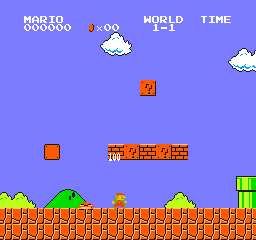
While Apple goes Intel, let’s return to that machine with PowerPC guts — the Xbox 360. Microsoft’s new console has a controversial feature that requires developers to let users replace the game soundtrack with their own custom playlists. Some of you readers say that’s bad for game music, while others are looking forward to turning off games with lousy scores.
CDM’s own resident game composer W. Brent Latta has his own take — just get ready to time-warp to 1985. -PK
A Legend is Born
In 1985 the world was rocked. Some of pop music’s best known acts released hit songs that year that still grace the airwaves today. Madonna tried to convince us that she was behaving “Like a Virgin” and that she was “Crazy for You”. Wham! asked the world to “Wake Me Up Before You Go-Go” and offered a “Careless Whisper”. Tears for Fears claimed that “Everybody Wants To Rule The World”.
In the world of video games, there was one man who clearly wanted to rule world: Shigeru Miyamoto – creator of our favorite Italian plumbers, Mario and Luigi.
Little did Miyamoto know that in creating 1985’s biggest video game – and arguably one of the most famous games of ALL time – he was also creating a gaming legacy. In so doing, the folks at Nintendo also gave us what is arguably the single most recognized video-game theme song of all time – the overworld theme from Super Mario Brothers.
Everybody Wants To Rule…The Sewers?
Surely there are those of us who can recall playing Super Mario Brothers on our NES while listening to the radio or our cassette tapes of Madonna, Wham! or Tears For Fears. But I would guess that very few of us can remember playing the game without also remembering the theme music. It was part of the package, part of the charm of the game. Rock bands, symphony orchestras, and parody acts have long utilized the “Overworld” motif from Super Mario Brothers to entertain audiences the world over. Though the audio limitations of the NES were significant, Koji Kondo – composer of the Super Mario Brothers theme – was nonetheless able to create a unique and memorable experience for the game – and one that has clearly influenced both the gaming world and the world of music.
Fast forward to the year 2005 – a little less than a year before the release of what are now affectionately termed “next generation consoles”. For those who are counting, we’re nearly four full generations beyond the original NES console – NES, Super Nintendo, Nintendo 64, Nintendo Gamecube, and in 2006 the ‘Revolution’. In recent announcements at GDC and E3, Microsoft’s Xbox division has made it known that one of the features of the forthcoming Xbox 360 will be the ability for end users to define their own custom playlists for any and all games on the platform. This means, in essence, that if the player uploads a library of MP3s to their Xbox or connects a compatible MP3 player, they can then create their own “soundtrack” for any game.
This feature is distinctly different from what was available on current Xbox games such as Burnout 2, or PC games like The Sims. These titles did allow the end user to create their own playlists, utilizing their own MP3 libraries. The important distinction here is that the decision was always at the discretion of the developer. If they wanted players to listen to the soundtrack that was developed specifically for the game, that was also their choice. In reference to our plumber friend above, think of Super Mario Brothers, but with the ability to separate the theme music completely from the game and effectively “overwrite” it with Maddonna, Wham! and Tears For Fears. Somehow I don’t think that “Like A Virgin” is the most appropriate soundtrack for defeating the King KoopaÖ
As we pointed out in our original take on this story, this new implementation in the Xbox 360 will be both blessing and curse. While we believe that offering more options for players is almost always a good thing – let’s face it, there ARE games out there that have some really, really bad music – the announcement has turned a number of heads in the industry. A great deal of care and thought – and an increasing share of the development costs – goes into the design of many of today’s game soundtracks. Hollywood heavyweights continue to make inroads into the industry, while long-time game composers continue to push the envelopes of interactive, non-linear music implementation. Many hard-core gamers keep game soundtracks in their music collections, with regular rotation alongside more notable, popular musicians.
To Be Continued . . .
Read part two of this article to hear what top game composers think of Microsoft’s direction.
